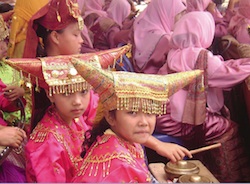Exciting results from working with Muslims in Sumatra on eco-programs
May 10, 2013:
 |
 |
 |
Minangkabu celebrations PICTURE DARWIN INSTITUTE |
A new report by the Darwin Initiative (DI) shows the exciting results they saw when they ran a major project to engage faith leaders in Indonesia in environmental action.
Integrating religion within conservation: Islamic beliefs and Sumatran forest management includes significant papers by Fazlun Khalid of IFEES, Professor Stuart Harrop of the Durrell Institute at the University of Kent, Fachruddin Mangunjaya, Yoan Dinata, Erlinda Kartika, Rusdiyan Ritonga, Jeanne McKayNurul Firmansyah, Feri Rolis, Rudi Febriamansyah, Jomi Suhendri, Ari Sutanti, Sandra Winarsa and Yasser Premana
BackgroundThe Indonesian island of Sumatra, Indonesia, is rich in diversity but has an average deforestation rate of two percent a year, which is clearly alarming. Seeing that Islam plays a central role in the daily lives of millions of people in Indonesia, the DI project started a project to promote the importance of biodiversity
conservation and its sustainable use to religious leaders who
had until then largely been uninvolved in environmental issues.
"By
engaging them and their followers in sustainable natural
resource management approaches that are explicitly based
on their religious principles, the DI project piloted a new
conservation model... in a way that was both culturally appropriate
(through the teachings of Islam) and replicable across most
of Indonesia."
They found that, by directly involving members of the community in
activities such as agroforest nurseries, a strong sense of ownership and
pride was created towards the project.
It also generated a
strong commitment from the two focal communities
to continue conducting Green Mosque campaigns,
community litter clean-ups and replanting activities around
their water sources (using native species from the DI
nurseries).
The Green Mosque campaign The DI Green Mosque campaign in Guguk
Malalo was so successful that it received nationwide media
attention and went on to win the provincial nomination to
represent West Sumatra in a national environmental
competition sponsored by the Ministry of Forestry. This then led to Guguk
Malalo receiving a special budget allocation and technical
support from the Government of Indonesia for its future
conservation activities, which will build upon the framework
developed by the DI.
EvaluationEvaluation was important, and this was done through questionnaire surveys
before and after each training activity, reporting significant increase in both knowledge of the issues and of the role of Islam in protecting nature.
The pre- and post-questionnaire surveys distributed
during a Ramadan campaign
conducted in the mosques and pesantrens (religious boarding
schools) revealed that in the mosques, Islamic teachings on
water conservation had raised levels of concern, as the
proportion of people who prioritised funding for watershed
forest conservation in the exit group was significantly higher
than those in the entry group.
From just the entry group, on the
environmental issues, younger and better educated
respondents tended to correctly identify the ecosystem
services provided by watershed forests than other
respondents. Younger and better educated respondents
tended to correctly identify the threats to water quality in West
Sumatra. However, on religious issues, women and less
educated respondents tended to identify a greater number of
correct answers on Islamic teaching towards the environment.
Women have key impact on Environment thinkingThe results from the Ramadan campaign in the
pesantrens found that female respondents were more likely to
correctly identify the services provided by watershed forests
and more likely to contribute their time to conservation
activities. As the report observed, this raises an interesting issue when considering
the prominent positions that men hold within Islam and the
importance of engaging women in a project of this nature.
Further, the Minangkabau culture recognises the importance
of women within their matrilineal system. Throughout the
project's duration, the involvement of women and their
support in the design and implementation of its activities was
met with such success and enthusiasm on their behalf that,
coupled with the results previously mentioned, a scientific
publication on the gender aspects of this project is being
prepared.
An unexpected outcomeIn closing, a somewhat unexpected outcome of the project
was the noted pause for reflection and appreciation received
from many religious leaders and devout followers, both men
and women (who considered themselves to be well versed on
the teachings of the Qur’an) when introduced for the first time
to Islam's many environmental
teachings.
The future"This further highlighted the potential that
such an approach could have on developing culturally
appropriate conservation practices, not only elsewhere within
Indonesia, but also throughout the rest of the Muslim world."
More information
Download the full report
|

